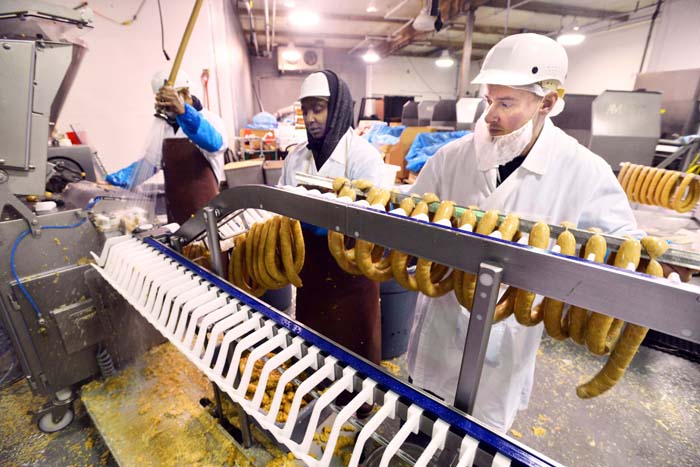Where the sausage is made
Published 8:51 am Thursday, January 15, 2015

- Employees make kielbasa on Wednesday at the Hill Meat Company in Pendleton.
The whiff of smoked pork drifts from Hill Meat Co. atop Airport Hill in Pendleton, hinting at the hot dogs, sausages and bacon curing inside. The family-owned and operated business has been making filler-free pork goods since 1947, but the focus is on the future.
Trending
Jim Cheney has the title of Hill Meat CEO, but he said his daughter, Nicole Sorensen, is the president and real show runner. They revealed Tuesday the company is in the engineering phases to add 20,000 square feet of manufacturing space to the plant, and to give the 60-plus-year-old building a big makeover, including lowering the ceilings and removing walls, installing better lighting and improved refrigeration.
The project will cost millions, they said, but the engineers predict the larger plant will use less energy than today, and more space will make it easier to add new production lines.
“It seems like we’re bursting at the seams all the time,” Sorensen said.
Trending
The renovation also will eliminate maintenance problems with the aging structure, she said, and her father pointed out it means Hill Meat can stay well above federal inspection standards.
“We want to be on the top side, not barely hanging on,” Cheney said.
The company, which now has about 80 employees, was on the brink of financial ruin, Cheney said, when he assumed ownership in 2001. Right away, Cheney made changes. For one, Hill Meat stopped selling products out the front door. Cheney said that made no sense when the company also wanted goods in grocery stores.
And he said Hill Meat used to handle its own distribution, sending delivery trucks to 40 or 50 places over two- or three-day trips. That was a lot of miles and bills of sale. So Cheney said he built partnerships with distribution warehouses that also once viewed Hill Meat as competition. The move cut deliveries to two or three stops in a day, while getting more Hill Meat products out there.
Hill Meat for several years sold most of its goods through the food service industry, distributors such as Sysco, or through restaurant and hotel chains, including McMenamins brew pubs and Red Lion hotels. Sorensen said that in the past couple of years the company has worked hard to get products into grocery stores, and has had success with independently owned stores such as Roth’s Fresh Markets, Red Apple and Albertson’s. The company brought a marketing specialist to gain better representation in the independent grocery market, and today, she said, Hill Meat has about a 50-50 split between retail and food service.
Hill Meat also has been able to sell products into corporate grocers, such as Safeway, but those have more red tape before a product can hit the shelves. Cheney said Albertson’s buying Safeway stores last year likely will benefit Hill Meat early this year.
Developing the retail market also came about because of a $10 million investment the company made a few years ago in equipment to maintain and improve consistency. Quality is subjective, Cheney said, but consistency matters.
Sorensen said Hill Meat also revamped packaging and a logo to reflect that its products contain quality protein, lack fillers and preservatives and are gluten- and allergen-free. Most Hill Meat goods have been that way for years, she said, but customers want to see that on the label.
Sorensen said late 2013 was the last time Hill Meat made a product that contained unlabeled allergens, such as soy or peanut dust. Unlabeled allergens are the No. 1 cause of food recalls in the U.S. for goods that fall under the eye of the U.S. Food and Drug Administration. Why would any company want that kind of headache, Sorensen said.
Social media is another new arena Hill Meat entered in late 2014 with a Facebook page. So far, there’s just 445 likes. And it goes dog-in-bun with a new company website.
Hill Meat’s growth and innovation, though, have roots in the old-fashioned notion of keeping business partners happy. That sometimes means sticking another company’s name on a Hill Meat product.
“We feel it is a partnership,” Sorensen said. “If we can help them grow their business, it will help us.”
And sometimes it means literally going the distance.
Cheney recalled a company on the Mexico border ran out of Hill Meat bacon, so he drove 18 hours to make the delivery.









